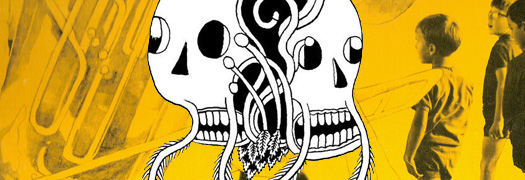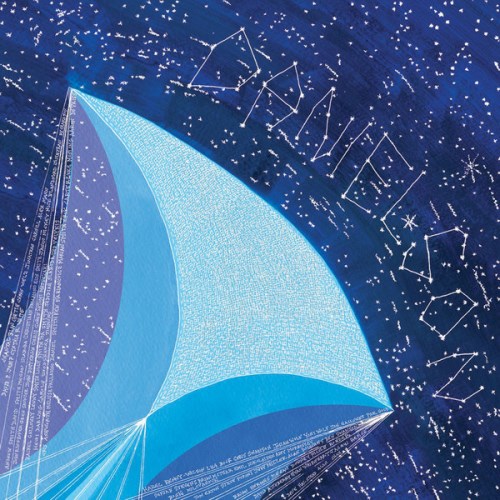
Features | Lists
By The Staff

80 :: Do Make Say Think
& Yet & Yet
(Constellation; 2002)
If, when the enigmatic Montreal label Constellation dropped Do Make Say Think’s & Yet & Yet in 2002, you weren’t just out of high school and about to tip into your 20s, leaning carefully into to the small freedoms and responsibilities of “adult life,” growing identities like snake skins and then immediately shedding, eating, and disgorging them, pulling away from old friends and plunging into the unsteady orbits of new ones, and feeling the malignant expansion of a dark corner of your consciousness that realized you didn’t know shit about anything, then I don’t know how you relate to this album. One of the perks, or possibly hazards, of instrumental music with such preverbal intensity is how perfectly it comes to serve as an accompanist to your own thoughts and experiences. & Yet & Yet is road trips and bad stoner philosophy and just getting used to drunkenness and sex being a regular part of life (late bloomer, ok?). All of the sadness and joy in this record rolls and surges irregularly, eschewing the unfortunate post-rock custom of travelling at an upwards 45 degree angle on a line graph where x = time and y = “intensity.” It pitches unexpectedly, throwing you off your feet and then pulling you back up, because whether or not your experiences match my sadly sheltered early adulthood, this is music that scores our lives. It’s landscapes and late nights and poking in the dirt with a stick, one of those universal sensations we’ve all felt.
Even relieved of all its associative weight, the thing is still plain gorgeous. Slow-moving at times, yes, but using moments of ennui as a gluey connector for peaks and chasms that otherwise just wouldn’t make sense. Each sound has a deliberate weight and tonal intensity. Woven synthwork sprawls over a gnarled acoustic scaffold, bass lines carve sinuous grooves into the framework, and every drum hit is a contribution to the interplay of elements rather than a rote pattern holding down a tired beat. Every noise is alive and curious. Whether it’s the warm synth, the slightly staggered snare hits of two drummers playing in perfect asynchrony, or a horn section wrapping itself around deep guitar chords, & Yet & Yet just sounds so good (let this album serve as a reminder that having well-tuned drums is so fucking worth it). Sandwiched between the album’s first six seconds of skidding static, which manage to capture a track’s worth of push and pull in and of themselves, and the beautifully dying hum at the end of closer “Anything For Now,” is sandwiched some of the best lights-off headphone fodder of the decade. Chew slowly.
Jessica Faulds

79 :: Danielson
Ships
(Sounds Familyre/Secretly Canadian; 2006)
I’ll concede at the very start of this blurb that several long-time CMG staffers think this record—one I adore in quantities that even the hyperbole to come can barely over-emphasize—is shit: capricious, indulgent, a confrontationally irritating mess. Or at least they did when Ships arrived, seemingly out of nowhere, in the spring of 2006. And, OK, I get their FUCK THIS WHY IS HE MEWLING DID HE JUST SAY “PIG PODS” reaction, at least initially; I imagine Chet’s head, unable to contain itself, gratuitously erupting at the first thirty seconds of “Two Sitting Ducks,” like that scene from Scanners except with a giddy soundtrack. But, regardless of how warranted those knee-jerks may be, or how right Chet’s head might be to detonate upon hearing Daniel squeal, “I’m gonna make you my prior-i-tay!”, Ships is unquestionably worth struggling and sticking with. Because here, in the often whimsical and, yes, confrontational recesses of Daniel Smith’s absurdly catchy folk-pop, is one of the most fascinating records of the decade.
Fascinating in part, unavoidably, because of the well documented history of Daniel and his extensive musical community, encompassing several branches of the Smith family, long-time friend Sufjan Stevens, members of Deerhoof, WHY?, Serena-Maneesh, Half-handed Cloud, and so many more. This context would be almost entirely beside the point were the record’s central theme—when not interrupted by non sequiturs about shy parrots and body baskets, or his best Cartman impression—not tethered directly to it. Ships is, triumphantly, the converging point of the entire Danielson Community over their twelve-year, seven-record arc—both the product and celebration of the peculiar journey from college thesis project to this, their defining Statement. Those dozens of collaborators come together in well-orchestrated turns, their leader’s enthusiasm in tow, to help fully realize what is easily their best collection of songs yet. It’s the kind of feel-good collective step forward that would beg for something corny about “stars aligning” had the album’s cover not already beat me to it.
Fascinating also because it holds up, four unanswered years later, as an endlessly rewarding and singular and above all else fun experience, one that, as Dom so perfectly described in his review, “[is] so full of hope and devotion and palpable love that it convinced me cheering up was as easy as an ineffable, osmotic transfer.” Granted, it can be a hell of a shrieky mountain to climb, and there’s not exactly much subtlety to be found in these eleven songs—from tone- and concept-setting opener “Ship the Majestic Suffix” through the cheeky “well done, us!” closer “Five Stars and Two Thumbs Up”—but a record so wholly devoted to celebrating itself is hardly concerned with anything but the superliminal. Tellingly, this is the same guy who, shortly before Ships‘ release, toured as a tree.
Nothing phallic about that! And, yeah, he’s almost daring you to not immediately dismiss something like dressing up as a goddamn tree as utter indulgence or one Flaming Lips-sized conceit too far. So too will Daniel’s vocal caterwauling have this effect on many, especially on those crucial first listens, for similar reasons. Yet, as “child-like” and mercurial as his singing/songwriting/choices in costumes may be, he’s hardly naïve of how gimmicky or beyond ridiculous a lot of it (and there’s plenty more; just throw on that Danielson: A Family documentary) may seem. This is ultimately what I find most engaging about Daniel Smith’s music, Ships especially: his willingness to be ridiculous in service of genuinely surprising and uplifting music, to indulge creative whims but in considered and focused strides, to hold not a single melodic yelp or epic structure or anthemic chorus back.
So, seriously: give Ships enough time to get past the initial WTF of Daniel’s voice, because there really is a wildly imaginative glut of celebratory pop to get wrapped up in. Just be extra forgiving at first, and um, definitely build up a hefty callous before tackling “Two Sitting Ducks.” Oh—and you’ll be relieved to know that, with the release of Ships, Daniel has traded in the Tree Of Life for these snazzy matching outfits. Like I said: a step in all the right directions.
Scott Reid

78 :: Luomo
Vocalcity
(Force Tracks; 2000)
If you heard Vocalcity when it was re-released in 2005 (or at any point since) without knowing the history and the context behind it, you’d still know it was something special. Sure, it’s constructed out of what has become a familiar amalgamation of influences in late-00s house music—the angular, clicky percussion borne from techno; the undulating bass lines and soulful vocal touches of deep house; the spatial philosophy of dub; the clean and simple production of minimal—but Luomo (a.k.a. Vladislav Delay, a.k.a. Sasu Ripatti) is clearly a man who thinks outside the box. It’s in the scale of the pieces he builds, the way the tracks slowly pan out from small details until suddenly we can see an overall vista that was altogether different to what we assumed we were witnessing four, eight, ten minutes earlier. Check out the slowly unfolding lyric on “Market,” which twists the familiar house tool of a looped vocal so the track’s apparent meaning is suddenly demolished and rebuilt when that loop finally plays out in full; or the way “Synkro’s” blissful but linear bass groove steadily falls apart over the course of thirteen minutes as filtered acid lines and fractured loverboy refrains slowly take over the track until it’s melted like chocolate in evening sunshine. The components may be familiar, but the deceptively simple way they come together is both unexpected and strikingly fresh.
Of course, the really remarkable thing about Vocalcity is when the aforementioned context and history come back into play: remember that this is an album from 2000, a time when almost nothing sounded quite like this. “The Next Episode in House,” read a sticker on the original issue, and that now feels like an understatement. Half the records you might hear on a Saturday night owe this album a favour, and yet the technical innovation within feels utterly secondary to what makes it still so remarkable. It’s been a long ten years and of course these sounds have been beaten to death by now, but very few of the stylebiters have ever been able to move this way since.
Jack Moss

77 :: Cam'ron
Purple Haze
(Roc-A-Fella Records/Diplomat Records/Def Jam Recordings; 2004)
Cam’ron is an asshole: this sorta hateful, egalitarian, glib motherfucker, relishing his own materialistic nihilism. But like a lot of assholes, he’s a funny motherfucker, too, almost magnetically loathsome. Think Swearengen, Bukowski, Albini. His persona comes through the mic whole; deplore at your leisure, but at least this is praiseworthy. In a genre that thrives on facelessness (T.I. and Jeezy turned this disposability into an art), Cam’ron’s Cam’ron-ness perseveres via one of the most subversive flows ever to bubble into the mainstream, full of leering slant rhymes and abstruse breath control. His flow doesn’t so much hit the beat as slap it around like a little brother, giggling along as his crew teases the track into an increasingly heated fury.
So call Purple Haze his sort of accidental masterpiece. This style, winning as it had been via slutty Dipset mixtapes and a handful of Just Blaze barn-burners, certainly merited no such triumph, but here it is. The sort of Cam’ron track that sounds best at ear-blistering volume is present here on skittery bangers like “Shake” and the slithering “Intro,” but without batting an eye he also slips on tracks of startling introspection, like the Good Times-sampling “Harlem Streets” or the romantic paean “Soap Opera.” He hits these wistful beats with the same linguistic clarity and rhyme-scheme opulence as he does anything else, taking two-and-a-half minutes of Kanye bounce on “Get Down” and logistically managing to both denounce Siskel and Ebert and half-recall, “We shared chicken sandwiches / They was a dollar fifty.” (The “chicken sandwiches” theme is explored fully.) Elsewhere he claims to be a “hooligan at Houlihan’s,” rhymes Lagerfeld (as in Karl) with Gargamel (as in the Smurfs) and claims tandem allegiances to Chicago, Ohio and Harlem. The result is an album that honors no hood, scene or narrative so much as the full chintzy panoply of rap radio in general, spanned across 21 uniformly excellent tracks and seething at every pore with the malevolent wit of its creator. Plus a few skits making fun of crackheads, of course.
Clayton Purdom

76 :: Paavoharju
Laulu Laakson Kukista
(Fonal; 2008)
Nowhere does the hierarchy of sounds dissolve so thoroughly and ecstatically than on Paavoharju’s second full-length. Here a burp of static becomes a church organ, the murmur of a baby awaking a full gospel choir, the tinkling of a crude xylophone the full-body vibrations of a disco beat, AM static a call to worship. This is a record which forces you to consider a vast landscape as an embroidered patch on a quilt you hope to never find your way out of on a Sunday morning. This is everything you heard as a child when you stuffed cotton candy into your ears at the carnival, multiplied by everything Kevin Shields heard when he thought aliens were communicating with him through his amp.
For those of us who have an equal affinity for both unbridled pop and the fringes of sound, Paavoharju really were like getting tickled by God: here is a band whose songs (really, actually, songs) seemed to already have their own history by the time they were recorded. I don’t know what they have to tell me and I don’t care. How could you, when every micro-slice of sound suggested an as-yet unrealized, equally detailed bubble of pop/un-pop behind it? Like any humble artists would do, faced with something bigger than themselves, they latched on to the first one that drifted by. The album only made a ripple, but this close it still looks to me like a tidal wave.
Joel Elliott

75 :: Ned Collette
Future Suture
(Dot Dash; 2007)
I find it hard to rationalize my love for this record, to somehow quantify its greatness in precise, objective terms. I like math; this is what my brain wants to do. But Collette’s talent as a songwriter is anything but easy to pin down: the way he evokes the Greats yet subtly eludes our tags (early Leonard Cohen meets Dungen!), gently tugging us along in his dark, dreadful yet inexplicably comforting world.
Emotionally, listening to Future Suture is like walking along a knife’s edge: at any given moment Collette seems poised to topple into blackness. Still, this album is so jam-packed with bittersweet moments of transcendent fucking gorgeousness that the drama’s easy to take in stride: those fuzzy synths that pillow Collette’s final adieu in “Country with a Smile”; the delirious ascent of “Sell Your Life”; that line in “Ned’s Dream” when he’s all, “I walked out further / One night from home / Than I had ever walked alone,” and you know exactly how he’s feeling at that very moment. This is the stuff that reduces music critics to assholish point-and-tell hyperbole. (See above.) So instead consider this: Future Suture is an album to live with, to always have on hand to soundtrack life’s jokes and trials when they confront you. Or, consider this: since its release in 2007, I’ve listened to Future Suture more times than any other album in my collection. How’s that for math?
Traviss Cassidy

74 :: Missy Elliott
Under Construction
(Goldmind/Elektra; 2003)
By the time Under Construction dropped in late 2002, Timbaland was already one of the biggest names in hip-hop, his brand of futurism, arguably the defining pop sound of the 2000s, in particularly fine form, his beats exhausting every start-stop, spacey-synth’d trick in the book. Those classic Timbaland drums—where they sound like, y’know, actual drums until you listen harder to whatever household and barnyard objects he’s rubbing together and think, “What is that?”—are within, on top, and underneath every track here, providing Missy’s own supple rhythm with an effortless, slinky, clicky counterpoint.
Under Constructions‘s title both places Missy’s sound on a timeline that has a future, as something that isn’t yet finished, and a past, building on achievements of pioneers like MC Lyte, thus allowing Missy and Timbaland room to bend the frozen-steel funk of previous single “Get Ur Freak On” to meet samples from Run-DMC and Rock Master Scott & the Dynamic Three. Tracks like “Back In The Day” and “Funky Fresh Dressed” assemble lyrical and sonic thematics from ‘80s rap building blocks, and Missy’s frequent spoken word interjections solidify this as a concept album of devoted old-school-ness. That Missy and Timbaland can do all this while flipping lines backwards in “Work It” is their particular genius; very few records this decade have evinced such historical awareness while breaking swaths of new ground and pointing a big arrow toward the better times ahead, whether or not those times are a point the artist will ever actually reach.
Missy and Timbaland keep the track list tight and the guest spots few, leaving just enough space for Missy to drawl, purr, growl, chant, and croon her way through each cut. She stares steel-eyed into the faces of Method Man, Ludacris, Jay-Z, and a young 50 Cent; there’s fire in each of their verses, but it’s nothing to what Missy calls in response. Confronting rumours, thrashing haters, and exhorting beefers to know the fragility of life and make peace, Missy has no need to explicitly address being a woman in a man’s world. Instead, she puts her money, flow, power, and sex on the table and tells her would-be suitors to step up. Unmatched in her output since, Under Construction is Missy Elliott’s last classic album, capping off a run of four that could stand toe-to-toe with any other artist in hip-hop—if it came to that.
David Ritter

73 :: Invincible
Shapeshifters
(Emergence; 2008)
Even if we didn’t pay attention to the lyrics on Shapeshifters— their spider web intricacy, the densely layered overlap of political ardency, cultural pride, and weary optimism that present themselves on every single rhyme on this towering freshman long-player—the manifold shit-hot production and dizzyingly poetic flow might have found it placed in this illustrious collection.
But, Christ, those lyrics. Where to start? “People Not Places” is probably the most trenchant politically themed song of this past decade, like, bar none. This is certainly partly to do with the fact that Weaver untangles herself from the manic and petty snarl of American politics (Buck Fush! Am I right) to focus on a pressing global issue, the Israeli – Palestinian conflict. But to deal with it in language so deftly specific, in context so historically objective, in tone so emotionally honest, and to do it on your debut record, is an act of confidence and technical prowess that boggles my manic, petty American mind.
If I excerpt a lyric, promise to keep in mind that the whole song is this dense and striking: “Recent history buried / but it speaks through the sand / All Jewish law returned / I don’t seem to understand / ‘A land without a people / for people without a land’ / But I see a man standin’ with a key and a deed in his hand.”
And that’s just one, admittedly emblematically fantastic, song! Even on more ideologically didactic tracks—like “Spacious Skies” dealing with American bravado, “Deuce/Ypsi” tackling gentrification in the notoriously liberal Ann Arbor, Michigan area, and “Ransom Notes” demanding sweeping changes in over-commercialized hip-hop culture—Weaver offers her strident rhetoric as salves against her own thoughtfully constructed portraits of urban decline. These aren’t separate achievements. Invincible is not both an astute political prophet and a ridiculous emcee because its immediately apparent from listening to this record that she couldn’t be one without the other. She couldn’t keep rapping if her measure of success was to cameo a verse on the next Gaga single, and without rapping her agenda would have no platform.
It would be enough to say the she pulled an 87% from Mark when he wrote this album up. Pulled. Hell, she wrested it from his miserly bosom with a crowbar and a blowtorch. But that is the least of Shapeshifters‘ many accomplishments. Weaver is fond of branding her music a sledgehammer, and that’s as apt a description as any, forceful and unyielding as it is. But if that is what her music is what her music does is something completely different. For that we must imagine a flaming bullhorn amplifying and broadcasting one of the most vibrant and provocative voices, not just in the recently booming Detroit scene, but in the whole of the rap game.
Eric Sams

72 :: OOIOO
Armonico Hewa
(Avex/Thrill Jockey; 2009)
The four albums OOIOO have released since 2000 are like the four horsemen of a very freakin’ fun apocalypse; a vision of the scattered reactivation of fleeting strands of global music cultures in the aftermath of some catastrophe, where the point of destroying civilization was to make it okay to have fun again—even if we couldn’t remember exactly how to do the honki ponki. All we’ll have left are monosyllabic expressions and an afrobeat to go with that Balkan trumpet riff. But where Kila Kila Kila (2004), Gold and Green (2005), and Taiga (2006) sometimes seem to go off the rails to achieve this placeless effect, Armonico Hewa is just so goddamn casual about it. It’s all, “no, we aren’t riffing Jimi Hendrix together with Fairouz; we’re just playing some OOIOO music.” And they’re doing both, which is the genius thing, and they’re experimental on top of that, lobbing poly rhythms at Muddy Waters stop-start guitar clusters and cheap synth noises that leak out the back before leaping into free fall with no discernible rhythm (sad, since I think Ai gets upset when she can’t precisely and fascinatingly hit things) before you get pinned to the wall again. I suspect haters find this bloodless and mathy, but I think there’s so much humor and thoughtfulness in these songs that it’s impossible to read the sonics as a record ledger of longitude and latitude coordinates. OOIOO may pluck shit up from all over the world, but when it comes out it’s a furious glut of self-expression, demanding that you ignore the regional trees for an awe-inspiring forest. One which possibly features unicorns. I mean, they slaughter them there, but that’s why this is adorable and brutal at the same time. And it’s also why, in my opinion, OOIOO are the best band of this decade, though other staffers won’t agree. But just think about it: what other band does this astonishing shit without really sounding like they’re trying to do this astonishing shit? That’s the magic fully developed with Armonico Hewa: an unendingly unnatural sound produced by a band that couldn’t sound more natural.
Mark Abraham

71 :: Broadcast
Tender Buttons
(Warp; 2005)
In accordance with the hallowed pact that we music critics once made never to speak of Broadcast without referencing French cinema: Broadcast are a band that began the decade in the reverie of a Jaques Demy musical and ended it in the stark, black space between the text of a Godard title card. Or, to put it another way, Broadcast began the decade a band who might have had (and did have!) a song on the Austin Powers: International Man of Mystery soundtrack, and ended it with, well, Tender Buttons. Though with their two previous LPs they gradually drifted away from the airy retro-pop of their early singles, nothing in their catalogue—not even the corroding moodiness of 2003’s Haha Sound—equipped us with the sort of breathing apparatus we’d need in the stark, subaqueous atmosphere of Tender Buttons.
Named for Gertrude Stein’s book of experimental poetry, Broadcast’s third album is a study in electro-pop minimalism and avant-garde wordplay. The line-up reflected this aesthetic sparseness: two of the band’s original members departed before the recording of the album, leaving just James Cargill and Trish Keenan. But two members proved more than enough to create the band’s most consistent and chilling effort to date. From the haunting synth notes that open “I Found the F,” Tender Buttons lulls the listener into a prolonged hypnosis both melodic and unsettling. And since we critics have a pact that obliges us never to mention Tender Buttons without using adjectives like “frigid” and “icy,” ostensibly to describe the record’s overall aesthetic, but also to act as thinly veiled (and questionably connoted) attempts to describe the robotic libido exuded by Keenan’s vocals, frigid doesn’t cut it; Keenan’s voice here is something else: otherwordly, disarming, like a post-apocalyptic Françoise Hardy, somehow conjuring enough oxygen to sing in space. The mesmerizing title track seems to be Keenan’s answer to a bet that she could even sound sexy reading the telephone book, or perhaps even more challengingly, this poetry: “the comb / the calm / the colour / the caress / the cortex.” Needless to say, she wins.
But Tender Buttons runs deeper than just prosodic foreplay. It’s a record haunted by emptiness—of meaning, of love, of language. The poems in Stein’s Tender Buttons were seemingly random groupings of words (the laconic poem “Peeled Pencil, Choke” goes, “Rub her coke.”) meant to expose the difficulties of description and communication that language forces us to confront. Broadcast’s Tender Buttons resonates with a similar emptiness of expression (“I found the fragrance separate from the flower / In all the logic I was lost,” Keenan speaks, opening the album); that’s its most resounding chill. While it might not boast some of the band’s best stand-alone songs (“Come on Let’s Go” resides on The Noise Made By People [2000]; Haha Sound gets “Pendulum” and a pretty unbeatable side B), Tender Buttons remains Broadcast’s most fully formed, sustained expression, a modernist horror story with a mesmeric soundtrack.





